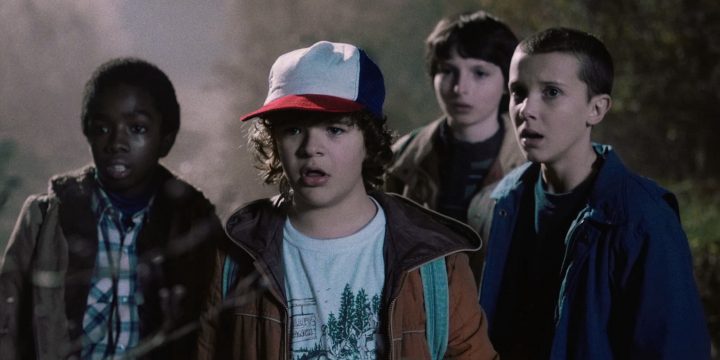Coaxial Cinema: The Changing Face Of The Small Screen

In a little under a month, the 70th Annual Emmy Awards, given out for accomplishments in television, will be handed out in America. They are regarded as comparable to the Oscars in terms of television awards, and given the rich depth of broadcast material available to us today, the race to receive an Emmy is never more profound than right now. In the last decade or so, television has become the entertainment equivalent of small screen cinema, such has been its impact on modern conversation. How many of us watch in horror the events of The Handmaid’s Tale or gather together to discuss the latest cliffhanger in Game Of Thrones? Enough of us for networks and studios such as Netflix to throw millions of dollars at an entertainment medium once considered the red-headed stepchild of storytelling.
Today, big-budget television shows can command similar audience volumes to major Hollywood big-screen blockbusters. A single episode of Game Of Thrones can command viewing figures domestically in the tens of millions of viewers, to say nothing of the global audience streaming or watching internationally. Television has become a banquet table for top-tier talent; traditionally, television and film stars never really crossed over into the alternative medium, but today it’s a given considering the demand for content and the extraordinary budgets afforded to many shows. Part of the rise of high quality television has been the demand by the audience. Gone are the days when you could allude to something happening off-screen and never show it: today, audience expectation has only gone higher and higher, requiring larger and larger budgets by production houses to create such thrilling content.

Most people point to HBO’s crime drama The Sopranos as the birth of modern high concept television. Since then, series such as Lost, Marvel’s ongoing Netflix series such as Daredevil and Punisher, and the aforementioned Game Of Thrones are just some of the examples of communal touchstone moments in television history that bond us together as we watch. The shared storytelling device television affords, far moreso than cinema, allows us to connect over an experiential narrative in a connective, ethereal way. If cinema is about spectacle, then modern television is about bringing us together in other ways.

The rise of streaming platforms such as Netflix, Hulu and Amazon have blown wide open the gates of television’s potential. Earlier this year, Netflix dropped a new Cloverfield movie onto its service immediately after teasing it during the Superbowl in an unprecedented move – it was literally two hours between trailer and release. Amazon has announced a multi-million dollar production of The Lord Of The Rings as a series to debut on its streaming service, and it’s no longer a surprise to see some episodes of a show debut in cinemas either before airdate, or in simulcast. The phrase “binge watch” has never been more prominent than it is today, as entire seasons of a show can drop at once, gobbling up entire weekends of your time as you hurry to watch the latest popular thing and talk about it at work the next week. Television has come a long way from the fuzzy old black and white days of the 20th Century. Television almost matches cinema for sheer quality of story and character, and has become the go-to media consumption outlet for a large proportion of the population. And these networks and businesses are taking notice.

One of the commonest complaints about our entertainment era is that there’s “just too much stuff to watch”, and this argument is one I’ve found myself grappling with at times as well. Between cinema and the superb quality of television content out there today, it’s almost impossible for one person to soak it all in, as much as we’d like to. This year’s Emmys will be a closely run race; Game Of Thrones and Stranger Things are my favourites for Best Drama Series, although were Westworld or Handmaid’s Tale to take home the gong I wouldn’t be upset at all. The fact that a series about ice zombies and dragons can go toe-to-toe with a nostalgic horror series and a sci-fi western and nobody bursts out laughing is indicative of the quality of shows we now have the opportunity to digest.
What a time to be a fan of good storytelling.

Agreed. TV has become a medium that allows for far more intricate and longer story arcs.
From Stargate through to Supergirl. Although I think it was the TV show Fringe that really made me realise how good TV can be.
The first season seemed a bit meh, but it was just interesting enough. I’d never watched Lost but heard bad things about JJ Abrams and didn’t expect it to go well, but the series got very intricate and detailed and had a great multiple season plot with seemingly unrelated events in the first season being given importance in the 4th season.
Anna Torv had multiple versions of her character with some swapping of her character between parallel dimensions and trying to play the doppelganger version of herself.
I still remember it fondly even though it’s nowhere near science fact, it was fun science fantasy and a really great drama.
There’s plenty of other great TV series which also get to tackle things that are very moving. The mothers unexpected death in Buffy the Vampire Slayer and the repercussions that has. More recently the story arc of Supergirls lesbian sister breaking up with her girlfriend because she wanted kids but her girlfriend didn’t and more recently the Martian’s father having their equivalent of alzheimer’s disease.
I’m sure there’s older versions. I’ve heard great things about Deep Space Nine and have that on my to watch list.
Great points, mate. Television has for the most part been a comparatively cheaper format to produce than cinema, often “quick and easy” with regards to money on the screen, but the offset to this has been terrific storytelling. The shows you mention, Star Trek, Fringe, Lost and the rest all relied on well written characters and plots to maintain audience interest, overcoming lower budgeted production values. Today’s benchmark has shifted upwards dramatically in terms of money spent making shows, and I think audiences now *expect* the higher budgeted programming to be just as good as cinema, if not moreso. Your point about television giving story time to develop across multiple episodes/seasons is also spot on.
The Sopranos may be the show that got this particular ball rolling, but it’s the streaming services upping the ante by releasing entire seasons at once that really changed the landscape beyond recognition to folks who grew up having to wait a week between episodes. Nowadays, you can gobble up a whole season in a day or two and move on to the next thing, or stretch it out over a few weeks. The ability to go at your own pace is a big deal.
The lack of commercials on premium cable and the streaming services is also a major plus. Creativity is given room to flourish when you don’t have to worry about offending sponsors. In a trickle-down sort of way, this has helped network shows that do have to deal with that issue because those sponsors see how successful the shows on Netflix, etc. are and are willing to let more things slide. From a storytelling standpoint, not having to deal with commercial breaks automatically makes the viewing experience more immersive. Even a great story can lose momentum when we have forced breaks to talk about cars, laundry detergent, etc. It also helps that many shows have very near, and occasionally beyond feature-length episodes. There’s just so much more room for characters and stories to grow.
My personal outlook on TV has been going through a metamorphosis because of this uptick in quality. I used to say I’m not a TV guy, I watch movies. And it was true. The only TV shows I saw for a really long time were the occasional episode of whatever my wife was into. Now, I’m still a movie guy, but I certainly have a few shows that I really enjoy. I’m also much more open to checking out new shows.
There does seem to be a (soon-to-be) casualty in the TV landscape, though – the sitcom. They appear to fit network TV better. They’re generally less about story and more about getting laughs. That doesn’t seem to translate well to the streaming services which seem to find their laughs sprinkled about serious to semi-serious programs. The ones I’ve seen on streaming services have been sub-par and none of them that I can think of captured the nation’s imagination. Do you think this will change? Will the streaming services get better at sitcoms? Or, are there a bunch of great shows that I just haven’t seen?
Okay, lots to unpack here. I agree: the rise of streaming as an outlet for either dripfed or binge-watching shows has revolutionised our consumption of media, and not just for films. I think platforms without commercial requirements (such as cable or premium channels) have far more flexibility with their content provision too, giving budgets and creative freedom more centrality in decision making. Here in Australia a show like Game Of Thrones would never air on commercial television without significant censorship (even for us, and we’re as liberal a land as there is when it comes to this kind of thing) but in saying that, The Handmaid’s Tale screens on our national ethnic broadcasting network SBS, unedited. One of the things I love about streaming platforms’ lack of commercials is that a show can go for an hour without breaking into sponsorship’s – which you mentioned – ruining the flow of things. Immersive television viewing is just as important as immersive cinematic viewing, IMO.
Network television (here in Australia, FTA is dominated by networks and their affiliates) has its place: reality TV programming, sitcoms, news, lifestyle and gameshow formats fit the commercial arrangement template pretty well, given the proclivity of stations and networks to chop and change their programming at the drop of a hat. Shows like Big Bang Theory continue to rate its tits off Down Under on FTA television, so sitcoms will be just fine I think – they’ll have to move with the times and find their niche, but there will always be a desire for quick-n-easy laughs on a primetime slot, much like gameshows. The high end platforms like streaming should remain the domain of premium content, such as long-form serialised content or films, much like we’ve got now. Comedy programming on premium platforms will primarily consist of shows that are funny but aren’t funny-ha-ha laugh-track, ones which ask the audience to follow along and not simply sit back and consume it like fast food. McDonald’s and Burger King haven’t ruined the idea of fine dining after all these years: there’s room on the field for all, it’s just a matter of working out where everyone belongs.
Great answer. To be clear, I don’t think sitcoms are completely going away. Their foothold just seems to be on a narrowing ledge. But yeah, there will always be a place for them somewhere.
With the final season of The Big Bang Theory being announced today, one wonders which (if any) sitcom might step up to take the crown of “most popular sitcom on television”….